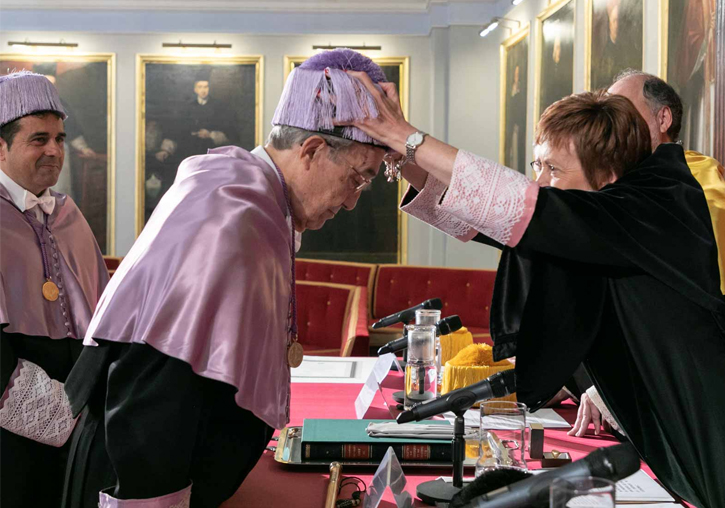Juan Pascual-Leone was invested Doctor “Honoris Causa” by the University of Valencia
- Marketing and Communication Service
- May 5th, 2023
The investiture of the distinguished scientist and professor, Juan Pascual-Leone, as doctor "Honoris Causa" by the University of Valencia took place last Thursday 4th May in the Paraninfo (Academic Theatre) of the historic building of La Nau.
The ceremony was chaired by the principal of the University of Valencia, Mª Vicenta Mestre and the professor of Basic Psychology of the UV, Mª Ángeles Cerezo, who was a sponsor and in charge of reading the laudatio. Moreover, Antonio Ferrer, professor of the Department of Developmental and Educational Psychology and dean of the Faculty of Psychology and Speech Therapy attended the investiture ceremony as a sponsor.
Paula Samper, director of the Department of Basic Psychology; Javier Roca, director of the Department of Developmental and Educational Psychology; Ana d’Ocon, professor of Basic Psychology and vice dean of the Faculty of Psychology and Speech Therapy; Francisco Alcantud, full university professor of the Developmental and Educational Psychology; many deans of the institution and members and representatives of the different university community’s colectives were present at the ceremony.
The investiture as Doctor “Honoris Causa” to Juan Pascal-Leona was launched by the Faculty of Psychology of the University of Valencia as recognition for being the first scientist in quantifying the capacity of mental attention.
On the lectio, Juan Pascual mentioned his beginnings as a medical student at the University of Valencia and his later interest in psychology, emphasizing the relevance of his work with Piaget, who started his career in this field and awoke in him the interest in developmental psychology. Through the intervention, he spoke precisely about his studies in regard of this topic and concluded explaining that knowledge is essential, but knowledge itself does not explain the cognitive development. The mental capacity to solve conflicts in new situations is also necessary.
You can read the complete lectio of Dr. Juan Pascual-Leone here.
The principal of the University of Valencia outlined in her speech that the distintion as Doctor “Honoris Causa” becomes “a man that, like he pointed out in his splendid lectio, authentic master class of the explanation of the mind through diagrams and operators, has always had the ‘tendency to observe the mind and cognitive way of being of children and adults”. During her intervention, Mestre spoke about her career as a psychologist as well, mentioning the institutional compromise and passion for psychology that the UV has as an academic discipline and also on its professional side.
You can access the complete speech of the principal Mª Vicenta Mestre here.
Mª Ángeles Cerezo, as the person responsible for reading the laudatio, undertook an overview of the Doctor’s trajectory and set out the reasons for obtaining this distintion, mentioning his great work in different fields and areas of psychology and education, and his constant enthusiasm of learning that led him to become the professional that he is today.
You can read the laudatio of the full university professor Mª Ángeles Cerezo here.
Juan Pascual-Leone
Juan Pascual-Leone (Valencia, 1933) is a developmental psychologist and founder of the neo-piagetian approach of the cognitive development. He obtained his PhD in Psychology at the University of Geneva with Jean Piaget in 1969. Before leaving Spain, he graduated in Medicine at the University of Valencia at the age of 24 and especialised in Psychiatry and Neurology at the University of Valladolid. Driven by his great interest in the human mind, he graduated in Experimental Psychology at the Rousseau Institute in Switzerland in 1963 and obtained a master in Psychology in 1964 at the University of Geneva, where he was just starting his way with Jean Piaget.
His work as an academic started at the University of British Columbia, Vancouver, and continued at the York University in Toronto, Canada, in the Department of Psychology, where he founded the Developmental Processes Laboratory, which became a global model of formation in investigation for some generations. Currently, Dr. Pascual-Leone is Professor Emeritus, Senior Scholar and he leads the laboratory with Dr. Janice Johnson at the York University.
In the Developmental Psychology, Pascual-Leone constitutes the origin of the neo-piagetian movement, which has a constructivist, meta-subjective and dialectical character. His line of work
and his discoveries have guided many investigators who, with their studies, have established that productive movement of a new theoretical and empirical investigation about the relations between
the process of information and the cognitive development. Precisely, for being the pioneer of this movement, it has more than 10.000 quotations of his works. It gives him great weight in the scientfic community.
His foundational work ‘A Mathematical Model for the transition rule in Piaget’s developmental stages’, from 1970 in Acta Psychologica, is between the 500 most cited articles in the Psychology field. In this work, Pascual-Leone proposed a mathematical model of mental endogenus attention, which explains how and where the human cognitive capacities develop.
From the 90s on, the investigator changed the focus on cogniv¡tive development and concentrated in adulthood and ageing. Proposing a model, for the adult stages of abstraction, based on his innovative ideas of cognitive skills in ageing that presents a cognitive analysis of these processes and the emergence of wisdom in later years.
His most recent investigation is about measure, cognitive giftedness and neuroscience. Especially, the connexion that creatively establishes between brain and conscience suggests very relevant developments in the current interdisciplinary investigation.
Categories: Doctors Honoris Causa , Facultat de Psicologia

















